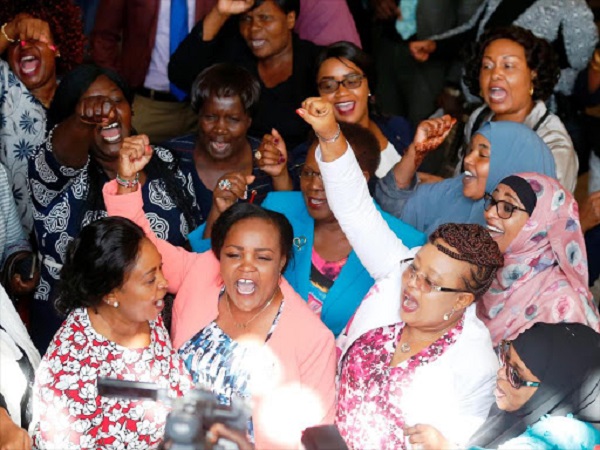| |||||||||
|
|||||||||
|
By:
Malemba Mkongo | |||||||||
| Posted:
Oct,19-2021 03:24:14
| |||||||||
| In 2017, Linda Shuma defied her fears and ventured into the political arena, coming from a civil society background. Deep down, she knew the obstacles and challenges that lay ahead of her, but she did not bow down to her fears. Shuma was selected to deputise gubernatorial candidate Hassan Omar in the last general election. All the other candidates had male deputies. “My family was so excited because if we were elected, I was to hold a very critical role in the county government,” she said. Unlike other deputies who were hand-picked, Shuma underwent an interview before a seven-person panel. She later learnt she was among 16 people who had been shortlisted for the position but she beat them all. But while she was excited over the new challenge, she was not prepared for the obstacles that would come with the whole electioneering process and Kenyan politics. In Kenya, female politicians face greater challenges than their male counterparts, forcing them to work three times harder to prove themselves. As a mother, a daughter and a friend, she had to be extremely cautious not to negatively make it to the headlines and blogs. Shuma was ridiculed for her decision to pair with Omar against the incumbent Hassan Joho and businessman Suleiman Shahbal. “Supporters of our opponents even tried to go into my personal life but they did not find anything to use against me,” she said. “I think what helped me was my life is straightforward with nothing to hide.” The girl’s rights champion says her secret weapon was not to be cowed by people. She was keen to make a mark and change the political narrative, especially for women from Coast, who, aside from the common challenges, have culture and taboos to deal with. POLITICAL OBSTACLES With the evolution of technology, more threats against women politicians are emerging. Malindi MP Aisha Jumwa has been a victim of online trolls and abuses. She has also faced physical and verbal attacks from her opponents and their supporters. Jumwa comfortably ranks among top female politicians who have endured a lot of tribulations and grown a thick skin, which has enabled her to remain politically active for years. She has been criticised and insulted for her political stands and her nature of handling her opponents or anyone who comes up against her. To some, her responses are signs of a strong woman who cannot be cowed by her opponents. But to some, her fearless nature is compared to playing in the mud and dancing to her opponent’s tune as responding to her attackers is seen as stooping too low. But political analyst Maimuna Mwidau said this is the kind of attitude and boldness that female politicians have to develop to succeed and remain in the political scene for long. Mwidau further said women need to be “tough-headed” and develop a thick skin towards the patriarchal beliefs, which will not end if women do not challenge their usefulness in this century. “Jumwa is a good example of women who are challenging some of the outdated beliefs through how she deals with her attackers and opponents,” she said. Mwidau said Kenya’s political scene, especially for female aspirants, needs fearless and bold women. The renowned analyst said patriarchal beliefs have for long been used to lock women out of the election process. “Culturally, women were meant to stay at home. They were not meant to be seen or heard,” she said. “However, with education, empowerment and development, they have moved from the kitchen to the decision table.” While women are slowly picking their spaces on the decision table, Mwidau said they are facing resistance from their counterparts and even from fellow women. This is evident from the trends of attacks both online and offline. As a result, many aspiring female politicians cringe at the corner for fear of suffering the same fate as their colleagues. Mwidau says young, female politicians are also sexually coerced by powerful leaders in the political parties in exchange for nominations or tickets. She said mostly, these women are denied space after they turn down the sexual advances. “Cases of women coerced for sex in exchange for party tickets or special seats are not new. This then locks out women who are morally upright and more potential female leaders,” she said. | |||||||||
|
Source:
The Star
| |||||||||
|
||||||||||||||||||||||||||||||||||||||||||||||||||||||||||||||||||||||||||||||||||||||||||||||||||||||||||||||
|
||||||||||||||||||||||||||||||||||||||||||||||||||||||||||||||||||||||||||||||||||||||||||||||||||||||||||||||


.jpg)




